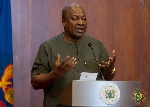Minority Caucus calls 2026 budget “illusion of stability” and “fiscal deception”
 Mohammed Amin Adams
Mohammed Amin Adams
The Minority Caucus in Parliament has delivered a scathing assessment of the 2026 Budget and Economic Policy presented by the government, describing it as deceptive, unambitious, and detached from the economic realities facing Ghanaians.
Addressing journalists in Parliament, the Caucus said the second budget of the current administration “offers no hope, no new ideas, and no credible pathway to growth,” insisting that the government continues to rely on policies designed under the previous New Patriotic Party administration and the IMF programme.
Mohammed Amin Adams, a former Finance Minister, led the presentation, saying the budget was “another blame-shifting document full of slogans,” accusing the government of failing to implement its own 2025 programmes and masking fiscal weaknesses with what he termed “weaponised underspending and accounting cosmetics.”
The Minority revealed that although Parliament approved capital expenditure equivalent to 1.5% of GDP for 2025, the government released only about 0.5% year-to-date—leaving an estimated US$1.1 billion in public investment unexecuted.
“This is not fiscal discipline; this is fiscal deception,” the statement declared, arguing that the cuts were driven not by efficiency but by revenue shortfalls, failed auctions, and rising debt service.
According to the Caucus, the under-execution has had significant economic consequences:
GDP loss: US$469 million
Revenue loss: US$75 million
Dropped potential growth: 0.1 percentage point
The Minority warned that thousands of construction jobs, infrastructure projects, and SME supply chains were lost due to the cuts, deepening unemployment and economic stagnation.
Underspending trends highlighted include:
Goods & Services: GHS 3.8bn released out of GHS 6.7bn allocation (56%)
CAPEX: GHS 11bn released out of GHS 32.6bn (34%)
They described this as evidence that the government “is incapable of implementing the programmes it announces.”
The Minority criticised the government’s flagship initiatives, particularly the 24-Hour Economy and the Big Push, describing them as underfunded and lacking credible implementation plans.
The 24-hour economy, expected to cost US$4 billion, has only GHS110 million allocated in the 2026 Budget—“an insult,” according to the Minority.
The Big Push received GHS13bn for 2025 but reportedly saw only GHS7.6bn in commitment authorisation.
The Caucus also rejected the Finance Minister’s claim that GHS63 billion in road contracts had been awarded under the Big Push.
“How is this possible when total allocations for 2025 and 2026 amount to only GHS43 billion?” they queried, accusing the Minister of violating the Public Financial Management Act if such contracts truly existed.
The Minority said the 2026 revenue projections—especially the estimated 18.8% rise in non-oil tax revenue—are unrealistic.
Revenue shortfalls for Q1–Q3 2025 include:
Total revenue: GHS154.9bn vs GHS162.6bn target
Domestic revenue: GHS153.9bn vs GHS160.7bn
Tax revenue: GHS124.6bn vs GHS133.5bn
They warned that if similar gaps occur in 2026, the government may introduce more taxes, accumulate arrears, or cut capital investments again.
The Minority also accused the Finance Ministry of routinely “sweeping” funds from institutions such as the District Assemblies Common Fund, affecting service delivery.
A key part of the Minority’s statement focused on what it described as a "historic collapse in market confidence."
Out of 45 auctions held in 2025, 25 reportedly failed, representing a 55% failure rate.
They said the government has lost investor confidence, forcing reliance on short-term T-bills and increasing rollover risks.
The GSE Composite Index fell 0.69% during budget week, which the Minority interpreted as a “market vote of no confidence.”
The Minority challenged the government’s claims of currency stability, alleging that:
The BoG has injected about US$8 billion into the market since January.
The appreciation from GHS14 to around GHS11 per dollar is the result of heavy interventions, not improved fundamentals.
Reserves accumulated by the previous administration are being depleted.
They cited the Bank of Ghana’s latest intervention framework—developed with the IMF—as confirmation that earlier interventions were “unsustainable and non-transparent.”
They also emphasised the BoG’s admission that the Gold Purchase Programme—introduced by Dr. Mahamudu Bawumia—is still the backbone of FX policy.
The Minority criticised the newly announced 9% increase in public sector base pay for 2026, calling it a “betrayal” that fails to restore lost real income.
They argued that inflation moderation has not resulted in lower prices, with food, utilities, and transport still “stubbornly high.”
The Caucus accused the government of taking credit for debt restructuring negotiated under the previous administration:
US$13.1bn Eurobond restructuring
US$5.1bn bilateral debt restructuring
GHS20bn domestic market operations
They also argued that new fiscal rules—including a 45% debt cap and an independent fiscal council—were drafted under the previous government.
The Minority reported widespread hardship:
Farmers are unable to sell produce due to low demand
Traders are experiencing slow business
GHS60 billion was withdrawn from the economy by the BoG to fight inflation
“Ghanaians will feel it this Christmas,” Dr. Forson said.
They further criticised the government’s decision to procure 2 jets, 4 helicopters, and 2 offshore patrol vessels costing US$1.2 billion, questioning the priority at a time when workers are being asked to sacrifice.
The Minority summarised the 2026 Budget as:
A growthless and jobless framework
Built on underspending, propaganda, and borrowed policies
Failing to address structural issues such as productivity, export competitiveness, and private sector expansion
They urged Ghanaians to brace for another disappointing year unless the government retools its approach.
Source: Classfmonline.com/Cecil Mensah
Trending News

Yirimambo Advocacy Group warns of looming aviation disaster at Upper West airport amid rising encroachment
13:05
MELPWU seeks Justice for Lab. scientist assaulted and detained by military during Hwidiem operations
14:31
Solemn wreath-laying ceremony held to mark President Rawlings' passing
13:37
Forestry Commission, FAO, World Food Forum train young forest champions in innovative forest monitoring
14:00
Razak Kojo Opoku analyses base pay trends from 2023 to 2026, urges labour to seek mid-year review if economic stability falters
10:10
C/R: Mankessim man sentenced to 16 years imprisonment for defilement
15:40
Dr Hoedoafia urges church–state partnership for justice and peace
14:09
DVLA boss honoured with prestigious African Digital Transformation Award
12:58
24-hour economy: Organised Labour collaboration to develop and implement reforms rather than unilateral imposition, says President Mahama
14:34
Ghana signs 2026 Hajj agreement with Saudi Arabia
13:42




